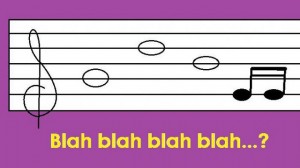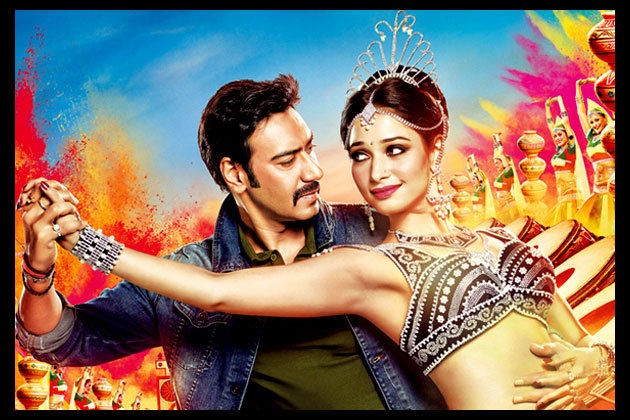Songs that go ‘Po po po’ and ‘Taaki taaki’ are the scourge of Bollywood. How can we ban these songs? Maybe we should have a writers’ collective that bans bad writing.
 by Jatin Sharma
by Jatin Sharma
Let me start this piece with a PJ I just invented:
Q. What did one car say to the other car during peak hour traffic?
A. Po Po Po Po Po Po Po.
If you just went “Chheee!” with this PJ, then I would like to draw your attention to the song lyrics that are hidden in the answer, and which inspired this PJ in the first place.
Song lyrics these days are completely devoid of meaning. Absurdity seems to be the new mantra in Bollywood. The rule of the game is ‘Writers/lyricists ki kya zaroorat hai (Who needs writers/lyricists?)’, ‘Koi bhi toh likh sakta hai (Anybody can write)’. Sure, but let’s get one thing straight.
 There is a difference between being literate and being a writer.
There is a difference between being literate and being a writer.
A writer weaves new words with new perspectives and gives a new definition to a mundane thing. A person who says ‘Po Po Po’ in a song, by contrast, should join circus and be fed to hungry lions. Similarly, when you say ‘Taaki oh taaki, tere baap ko main nana banaunga‘ and ‘Mere toh L lag gaye‘, you are not writing something clever, but merely trying to be clever (and failing). Just because you can buy a pen for Rs 2 doesn’t mean that you should create content that is worth the same amount too.
Yes, I know the people who want to defend these songs will say, “But that is what people want.” Well, it’s time you dusted the dust off your brains. People read and listen to what the media and writers give them. If you are not going to give them meaningful lyrics, they will listen to your absurdity and laugh for a little while, but your creation is only going to be momentary. Hard to digest? Let’s prove it with a fact. The yesteryear film songs and poems that have had beautiful meanings and are little gems of poetry cut across generations and are a hit today, too. But look at your new age Po Po Pos and Lo Lo Los: they come and go and nobody cares to find out where they disappeared. These supposed songs are a mere reflection of an attitude where business has taken over art.
Creative agencies like radio stations have gone the lewd way in their speech, movies based on SMS forwards and cheap jokes, and TV channels and movies churning out one product after another based on the last hit that made millions, show that India has little place for its intellectuals. Most of the good writers and people who are serious thinkers hate to associate themselves with our mass media because they are beginning to think that mediocrity rules the roost there.
Look at American TV shows like Grey’s Anatomy or Friends; you may or may not be fans of these shows, but you can’t deny that research, a well-defined plot and depth of
characterisation back these shows. And all credit goes to their writers. Now consider TV shows in India, where the basic plot revolves around love, death of the lover/married partner, followed by reincarnation after outrageous time leaps, interspersed with constant scheming and bitching, plus constant repetition of about three shots to complete an episode. Writers are looked upon as fools, called on to write incredible twists to pull up shows with sagging TRPs, put in astounding situations just to shock the audience. Because nobody respects writers, it seems that writers, too, are not respecting themselves.
Writers of an era long gone were people who would write in order to feed their passion; today they write to feed their greed. Someone has correctly said that, “Writers with empty stomachs are full of sensible words.” May be today’s writers don’t have stomachs empty enough for passion and ambition. May be they are richly fed on what works commercially. Or how to compromise on what they hold dear, so that they can create something that sells.
Naturally, writers are succumbing to the rat race and the people who demean the very art of writing, because those people hold the big bucks.
Writing meaningful things needs to rise above deadlines and restrictions. Thoughts cannot be tied up in the ropes of business. They are free and priceless. It is up to the ‘patrons’ of art to understand just how to bring the best out of such a fantastic creative process.
Jatin Sharma is a media professional who doesn’t want to grow up, because if he grows up, he will be like everybody else.
(Pictures courtesy in.movies.yahoo, community.sparknotes.com)




